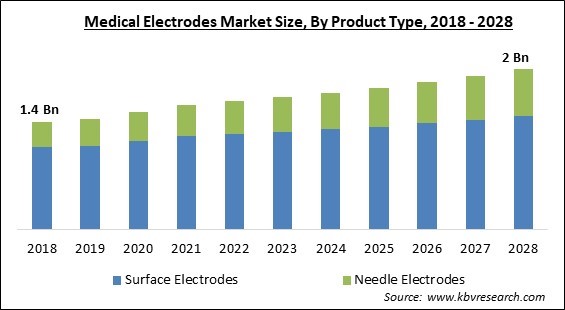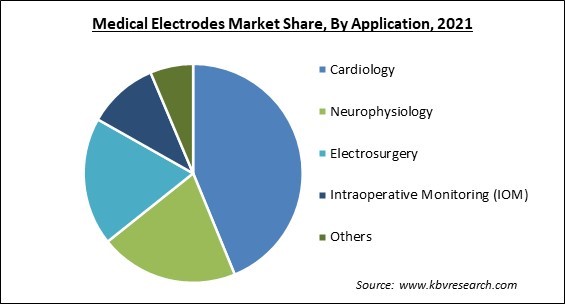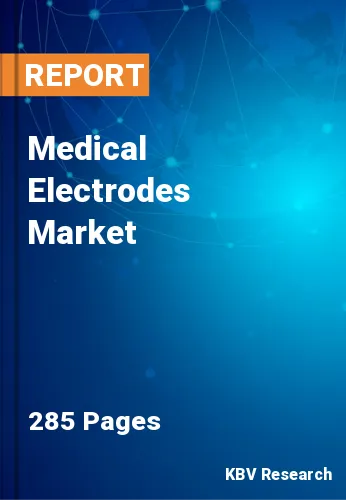The Global Medical Electrodes Market size is expected to reach $2 Billion by 2028, rising at a market growth of 3.8% CAGR during the forecast period.
Medical electrodes are tiny metal plates or needles used in surgery or treatment that transfer electricity from a piece of equipment to the patient. In order to assist in the diagnosis of specific disorders, electrodes also transfer electrical impulses from muscles, the brain, the heart, the skin, or other bodily regions to recording equipment.
Electrodes come in a variety of forms, including those used for electrocardiography (ECG), fetal scalp electrograms, electroencephalograms, transcutaneous electrical nerve stimulation (TENS), and pacemaker electrodes. Medical electrodes make it possible for ionic currents to be converted to electrical currents in the body that can be analyzed, amplified, and utilized to diagnose the patient's medical state.

Lead, metal, and an electrode conducting plate make up a medical electrode. These tools are used in conjunction with monitoring devices to provide ongoing care for individuals with a range of diseases. The electrodes are frequently distinctive in the activities they assist with performing, usually simple to use, affordable, disposable, and easily sterilizable.
The electrode's primary function is to ensure the patient has the maximum electrical contact with the equipment being used to record or measure activity. In the medical setting, electrodes are utilized for a variety of operations and examinations. They can be effective illness and disorder predictors when used in tandem with monitoring systems.
The market was impacted by a decline in the overall utilization of medical electrodes, which was caused by a decline in the volume of elective, diagnostic, and non-essential procedures as well as a decline in the use of routine testing. An optimistic view on the increased usage of electrodes was also provided by the growing quantity of research efforts. As an illustration, a research group from Aarhus University developed a particular biocompatible electrode to support electrical muscle stimulation and prevent patients from losing too much muscle. In the coming years, the medical electrode market is bound to grow owing to the increased R&D in the field.
Over time, there has been a significant rise in the prevalence of sleep disorders and cardiovascular and neurological ailments. The frequency of diagnostic and therapeutic operations has consequently increased. The expansion of medical electrode usage is being driven by the high demand for such operations. With 17.9 million deaths per year, cardiovascular diseases (CVDs) remain the world's most common cause of death. Neurological problems also affect millions of individuals globally.
Direct writing, coating, and patterning are a few nano-micromanufacturing methods that have recently advanced the electrodes. Additionally, it has been researched that a variety of materials, including carbon, metals, conductive polymers, and composites, can serve as a base for creating superior dry electrodes. Researchers have addressed cutting-edge techniques for enhancing physical adhesion, such as dry electrode adhesion and conformal contact.
Wet electrodes, also known as Ag/AgCl electrodes, are widely used in modern EEG-based brain-computer interfaces (BCIs). In order for these electrodes to function well, the gel must be applied to the skin, and the skin must also be prepared. The AgCl/ Standard planar electrodes cause two primary problems. First is skin preparation, which can cause abrasive sores in some people, and the second is the administration of conductive paste or gel, which can be conductive. Both of these drawbacks are related to the skin.
Based on product type, the medical electrodes market is bifurcated into surface electrodes and needle electrodes. The surface electrode segment garnered the highest revenue share in the medical electrodes market in 2021. It is an electrode on the skin's surface monitoring the electric potential that is present there. It detects the heart, brain, and nerve signals. The ECG signals are detected by larger surface electrodes. The EMG and EEG signals are detected by smaller surface electrodes.

On the basis of application, the medical electrodes market is divided into cardiology, neurophysiology, electrosurgery, interoperative monitoring (IOM), and sleep study. The cardiology segment acquired the largest revenue share in the medical electrodes market in 2021. This is due to the rising prevalence of cardiovascular disorders around the world. Out of all the cardiovascular fatalities, strokes and heart attacks were the leading causes of death for most people.
On the basis of modality, the medical electrodes market is categorized into electrocardiography (ECG), electroencephalography (EEG), electromyography (EMG), brainstem auditory evoked potentials (BAEPs), and others. The electroencephalography segment procured a substantial revenue share in the medical electrodes market in 2021. It aids in locating certain brain abnormalities. By placing approximately 10 to 20 electrodes on the patient's scalp in various locations and monitoring the electrical, and ionic waves of neuronal activity, brain wave rhythms can be captured and examined.
| Report Attribute | Details |
|---|---|
| Market size value in 2021 | USD 1.6 Billion |
| Market size forecast in 2028 | USD 2 Billion |
| Base Year | 2021 |
| Historical Period | 2018 to 2020 |
| Forecast Period | 2022 to 2028 |
| Revenue Growth Rate | CAGR of 3.8% from 2022 to 2028 |
| Number of Pages | 285 |
| Number of Tables | 490 |
| Report coverage | Market Trends, Revenue Estimation and Forecast, Segmentation Analysis, Regional and Country Breakdown, Companies Strategic Developments, Company Profiling |
| Segments covered | Product Type, Modality, Application, Region |
| Country scope | US, Canada, Mexico, Germany, UK, France, Russia, Spain, Italy, China, Japan, India, South Korea, Singapore, Malaysia, Brazil, Argentina, UAE, Saudi Arabia, South Africa, Nigeria |
| Growth Drivers |
|
| Restraints |
|
Based on region, the medical electrodes market is analyzed across North America, Europe, Asia Pacific, and LAMEA. The North American segment witnessed the largest revenue share in the medical electrodes market in 2021. This is due to a growing emphasis on technology developments in medical electrodes, an increase in the region's senior population, an increase in the prevalence of chronic illnesses, and high healthcare costs.
Free Valuable Insights: Global Medical Electrodes Market size to reach USD 2 Billion by 2028
The market research report covers the analysis of key stake holders of the market. Key companies profiled in the report include 3M Company, Medtronic PLC, Koninklijke Philips N.V., ConMed Corporation, Becton, Dickinson and Company, Natus Medical Incorporated, Ambu A/S, Cognionics, Inc., CooperSurgical, Inc., and Dymedix Diagnostics.
By Product Type
By Modality
By Application
By Geography
The Medical Electrodes Market size is projected to reach USD 2 Billion by 2028.
Increasing Occurrences Of Cardiovascular And Neurological Disorders are driving the market in coming years, however, Disadvantages Of Dry And Wet Forms Of Electrodes restraints the growth of the market.
3M Company, Medtronic PLC, Koninklijke Philips N.V., ConMed Corporation, Becton, Dickinson and Company, Natus Medical Incorporated, Ambu A/S, Cognionics, Inc., CooperSurgical, Inc., and Dymedix Diagnostics.
The expected CAGR of the Medical Electrodes Market is 3.8% from 2022 to 2028.
The Electrocardiography (ECG) segment acquired maximum revenue share in the Global Medical Electrodes Market by Modality in 2021 thereby, achieving a market value of $967.9 Million by 2028.
The North America market dominated the Global Medical Electrodes Market by Region in 2021, and would continue to be a dominant market till 2028; thereby, achieving a market value of $772 Million by 2028.
Our team of dedicated experts can provide you with attractive expansion opportunities for your business.

